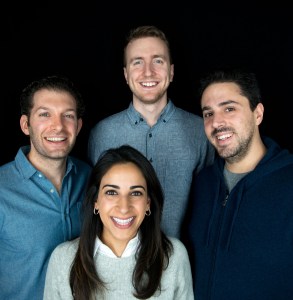BoxGroup has quietly, yet diligently, been funding companies at the early stage for over a decade. The 11-year-old firm in fact was the first investor in Plaid, a fintech company that nearly got sold to Visa last year for billions of dollars.
It has seen a number of impressive exits over the years, proving an eye that can detect winners before the winners themselves may even realize it. In fact, it’s that early faith in companies that partner David Tisch believes has been key to BoxGroup’s success.
“If you’re starting a company and you’re going to raise money, that first yes is the hardest. And it’s that’s the one that gives you the confidence, the excitement – to know that there’s somebody out there that’s going to believe in this and give you money for it,” Partner David Tisch told TechCrunch. “We really do try to pride ourselves on being that first yes on a regular basis. So the earlier we meet companies, the better.”
Today, BoxGroup is announcing it has beefed up its war chest so that it can be that “first yes” to more companies with the closure of two new funds totaling $255 million of capital. BoxGroup Five is the firm’s fifth early stage fund, and is aimed at investing in emerging tech companies at the pre-seed and seed stages. BoxGroup Strive is its second opportunity fund that will back companies in their subsequent follow-on rounds. Each fund amounts to $127.5 million.
Over the years, BoxGroup has made over 300 investments including having invested in the earliest rounds of Ro, Plaid, Airtable, Workrise, Scopely, Bowery Farms, Ramp, Titan, Warby Parker, Classpass, Guideline and Glossier. It has had a number of impressive exits in Flatiron Health, PillPack, Matterport, Oscar, Mirror, Bark, Bread and Trello.
Besides being the first firm to write Plaid a check, BoxGroup was also the first investor in PillPack, which ended up selling to Amazon for just under $1 billion in 2018.
BoxGroup Five – the firm’s early-stage fund – will invest in about 40 to 50 new companies a year with investments ranging from $250,000 to $1 million.
“We want to be the second or third biggest check in a round,” Tisch said.

Image Credits: BoxGroup; Adam Rothenberg (left), Nimi Katragadda (bottom), Greg Rosen (top), David Tisch (right)
The opportunity fund occasionally makes later-stage investments in new companies, but mostly just continues to support companies it invested in at an earlier stage. For example, BoxGroup first invested in id.me in 2010.
“The company is sort of an 11-year overnight success that we’ve been backing for over a decade now,” Tisch said. “It’s an example of us just continuing to support companies through their life cycle.”
BoxGroup also pre-seeded digital healthcare startup Ro, but also funded every round it’s raised since, including its most recent $500 million funding at a $5 billion valuation.
Tisch describes the BoxGroup six-person team as “generalists” in terms of the spaces it invests in, with a portfolio consisting of startups in the consumer, enterprise, fintech, healthcare, marketplace, synthetic biology and climate sectors.
Interestingly, BoxGroup’s last fund closures – which totaled $165 million – marked the first time the firm had accepted outside capital in nine years. Prior to that point, it had been funded with only personal capital. Its LPs are a mixed group of endowments, foundations and family offices.
For BoxGroup, building authentic relationships with founders is at the root of what the firm does, says Partner Nimi Katragadda. That includes taking bets on founders, sometimes more than once, even if one of their companies didn’t work out. It means backing just ideas in some cases, and people.
“This cannot be transactional, it has to be personal,” she said. “We want to go on a journey with someone for a decade as they build their business…. We’re comfortable with what early means, including a lot of assumptions, more vision than traction, and raw product.”
Partner Adam Rothenberg agrees, saying: “Our goal is to be the friend in the room. We believe in honesty, tough love, and transparency in building relationships with founders. We focus on the “how” more than the “what” — how a founder thinks, how they will build product, and how they think about attracting talent.”
With offices in San Francisco and New York, the firm will likely be growing in the near future as BoxGroup is looking to add on some “first-line investors,” Tisch said.
Recently, Greg Rosen was named a partner at the firm. Rosen originally joined BoxGroup in 2015, where he spent three years before leaving to join Benchmark. He re-joined BoxGroup in early 2020 and joins the firm’s three other partners: Tisch, Rothenberg and Katragadda.
While the world of venture is crazy hot right now, Tisch said the firm keeps itself grounded with a wisdom that can only be gained with experience and in time.
“There is seemingly infinite capital waiting to be deployed,” he said. “Without calling the cycle, we know that over time markets go up and down…No matter where we are in a given cycle, smart and determined minds will come together to build important technology companies. Our job is to make sure we are meeting those founders and choosing wisely about which ones to partner with for 10+ year journeys.”
https://ift.tt/3fnnlJA BoxGroup closes on $255M across two funds to back startups at their earliest stages https://ift.tt/3A0QoKJ













0 comments
Post a Comment